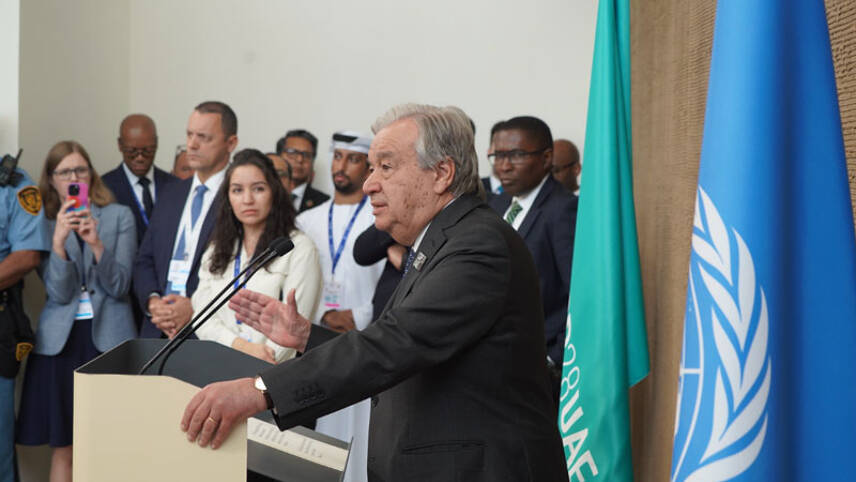Register for free and continue reading
Join our growing army of changemakers and get unlimited access to our premium content

Image: UNFCCC Flickr / Amira Grotendiek
Guterres arrived back at the UN-convened climate summit on Monday morning (11 December), just one day before official talks are due to wrap up. He was present for the opening and then departed to attend emergency council meetings on the Israel-Hamas conflict centered on Gaza.
Returning to Dubai, Guterres nailed his flag to the mast once again and implored negotiators “to seek compromise for solutions – without compromising on the science or compromising on the need for the highest ambition”.
Guterres said in a statement on Monday morning: “We are in a race against time. As I said at the opening of Cop28, our planet is minutes to midnight for the 1.5C limit. And the clock keeps ticking. Cop28 is scheduled to wrap up tomorrow, but there are still large gaps that need to be bridged. Now is the time for maximum ambition and maximum flexibility.
“Ministers and negotiators must move beyond arbitrary red lines, entrenched positions and blocking tactics.
“It is time to seek compromise for solutions – without compromising on the science or compromising on the need for the highest ambition. In our fractured and divided world, COP28 can show that multilateralism remains our best hope to tackle global challenges.”
These crucial final hours will see nations committing to either a fossil fuel phase-out or phase-down, the difference between which is significant.
More than 130 parties want to see a phase-out, including alliances of the most climate-impacted developing island states, the EU and New Zealand. Global South activists and Western thought leaders including Mary Robinson, Paul Polman, and Alok Sharma have also urged a decision on a phase-out.
But while the direction on coal was set at COP26 two years ago, petrostates including Saudi Arabia are continuing to block strong language on oil and gas. There have also been conflicting statement from the COP28 Presidency team itself, given that the UAE government derives 40% of its income from oil and gas, and with summit President Dr Sultan Al-Jaber being the chief executive of its state-owned energy company ADNOC.
Additionally, rows are ongoing on whether the fossil fuel statement should cover all oil and gas, or only that which is ‘unabated’ by efficiency measures and man-made carbon capture. The USA is a key proponent of an abatement clause.
Oxfam International’s climate policy lead Nafkote Dabi said any mention of abatement “is a dangerous trick” that would be a “gift served on a silver platter to the fossil fuel industry”.
Guterres said: “It is essential that the Global Stocktake recognises the need to phase out all fossil fuels on a timeframe consistent with the 1.5 C limit – and to accelerate a just, equitable and orderly energy transition for all.”
A new draft Global Stocktake emerged at around 1.30pm UK time, or 4.30pm in Dubai. Changes made since the previous iteration removed potential options for a fossil fuel phase-out.
The text now states that nations should “reduce both consumption and production of fossil fuels, in a just, orderly and equitable manner so as to achieve net-zero by, before, or around 2050 in keeping with the science”.
Phase-down and beyond
COP28 President Al Jaber caught a lot of heat after comments he made before the summit, in an online event, were surfaced by the Guardian. He stated that he had seen “no science” stating that a fossil fuel phase-out would deliver 1.5C.
Al Jaber swiftly stated that his comments had been misinterpreted despite a full recording being provided.
He also has reiterated his Team’s ongoing work with the International Energy Agency (IEA) on operationalising its recommendations to treble global renewable energy capacity and double the rate of energy efficiency this decade. These recommendations, now supported by 130 nations, are coupled with strong calls to action on fossil fuels including:
- Halting the development of all upstream oil and gas projects with long lead times immediately
- Gas-fired power generation peaking in the mid-2020s
- Fossil fuel demand falling by 25% by 2030, and 80% by 2050
The IEA and COP28 Presidency team issued a final joint statement late last week confirming that they would sway negotiations towards “an orderly decline of fossil fuel use demand by 2030, starting with no new coal plants”.
The statement also reiterated a much-criticised initiative launched at COP28, convening dozens of big oil and gas companies in a joint commitment to tackle operational emissions with a focus on methane. Critics have noted that the commitment excludes 95% of the sector’s footprint, which lies in the burning of its fuels. Another point of contention is the sector’s continued under-investment in renewables.
In an assessment of official COP28 negotiations and additional country commitments so far, published on Sunday (10 December), the IEA warned that they would only likely cover one-third of the emissions gap through to 2030 in a 1.5C-aligned pathway. The coverage would be even lower with a phase-out rather than a phase-down. The IEA’s assessment can be viewed here.


Please login or Register to leave a comment.